STATEHOUSE REPORT | ISSUE 22.03 | JAN. 20, 2023
NEWS: Agencies prioritize Covid severity levels over case quantities
NEWS BRIEFS: Murdaugh trial set to begin next week
LOWCOUNTRY, Ariail: Gerrymandered
COMMENTARY, Brack: One American story worth reading
SPOTLIGHT: Palmetto Care Connections
ANOTHER VIEW, T. Ravenel: My dad was S.C.’s last true character
FEEDBACK: On Lee’s books, Brack’s articles
MYSTERY PHOTO: Man on a bench
Agencies prioritize Covid severity levels over case quantities

By Chelsea Grinstead | With so many people using home tests to check whether they have Covid-19, you may wonder how accurate state-reported data are in framing the prevalence of the disease.
Short answer: State data are kind of like the fishwrap that newspapers become. The numbers indicate increases in Covid-19 cases within a population, but little more.
Weekly Covid-19 case numbers have been underreported to federal institutions throughout 2022 due to the wide availability of self-administered testing, according to a Charleston public health expert. But, those numbers still alert the public to spikes in Covid-19 transmission.

“When those numbers go up for the reported cases, it’s telling you that there really is an increase happening out in the community,” said Dr. Michael Sweat, director of the Medical University of South Carolina (MUSC) Center for Global Health. “They are real data — there’s weaknesses to them, but they’re better than nothing.”
Meanwhile, experts say wastewater testing is a more accurate way to measure the number of Covid cases.
“We know that [cases are] underreported — and so wastewater would be a more reliable indicator,” said Dr. Brannon Traxler, director of public health for the state Department of Health and Environmental Control (DHEC). “We have 15 sites in South Carolina and they are fairly well spread out … [but] there are a lot of places in the state [from which] we are not getting specimens.”
And Charleston County is one of them. Its wastewater treatment facilities were contributing data to the Centers for Disease Control and Prevention (CDC) and DHEC’s wastewater surveillance dashboard in 2021 and part of 2022. But, Sweat said the last data reported for Charleston County was in August 2022.
What experts say about weekly Covid numbers
The weekly Covid case numbers reported by the CDC and DHEC are best interpreted as a baseline for the actual transmission rates, Sweat said.
“The Wall Street Journal worked with several academic epidemiologists and came up with an analysis in May 2022. They very carefully looked at this issue and estimated based on the data that was analyzed that [the real number of cases is] about six to 10 times the number that we see [reported]. So right now [if] it’s like 22 cases per 100,000 — it’s probably more like 220 per 100,000.”
Biases have always existed in Covid case reporting, Sweat said, because since the beginning of the pandemic people who were infected with Covid-19 didn’t undergo reportable testing.
“I just think you have got to be careful that perfection doesn’t become the enemy of the good.”
Sweat described Covid weekly case counts as a canary in a coal mine. “The numbers give you a warning,” he said.
How severity relates to case quantity
Three years into the pandemic, the CDC and DHEC now urge people who want to better understand the virus to look at its community levels map to see the severity of cases instead of looking at the number of cases.
Community levels, which take into account transmission and hospitalization rates, became a metric about a year ago to indicate whether hospital systems are inundated with serious Covid-19 cases.
“The argument is: ‘We now have therapeutics and vaccination and immunity and what really matters is the impact on the hospital system, because we can’t really allow the hospital system to get overrun,’” Sweat said. “In essence, the CDC is saying, ‘We’re going to de-emphasize high transmission and focus on transmission coupled with impacts on hospitals.”
The community levels map demonstrates the severity of spikes by labeling state counties as red, yellow or green in relation to high, medium or low levels of Covid-19.
“What [DHEC has] stressed over the course of the pandemic is not necessarily that those daily case counts are incredibly important, but more to focus on the negative outcomes [such as] hospitalizations, severe illness and death,” said Louis Eubank, the director of DHEC’s Covid-19 Coordination Office. “And since we’ve seen an increase in the non-reportable tests, the numbers that DHEC reports now on a weekly basis seem lower than they have at other points in the pandemic.”
While it’s important to realize the virus is still present in every community in the state, Eubank said, the CDC created the map as a tool for the public to see the outcomes of viral transmission in the areas in which people live, travel and vacation.
“[County levels] also give families and individuals information as to their risk level based on their current health,” Eubank told the Charleston City Paper. “The situation could be very different for someone who’s immunocompromised — they may need to take different actions than someone like me who’s healthy and in their 30s. [The] levels really give you a tool to make those personal health decisions that are right for you.”
On wastewater analysis
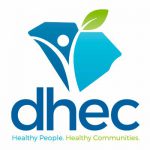 Wastewater testing detects Covid-19 the same as you would in the nose or in the back of the throat, Traxler said. An analysis is performed on specimen samples to determine how much Covid-19 is present in wastewater to gauge the burden of infection in communities.
Wastewater testing detects Covid-19 the same as you would in the nose or in the back of the throat, Traxler said. An analysis is performed on specimen samples to determine how much Covid-19 is present in wastewater to gauge the burden of infection in communities.
“Wastewater — that is one of the best metrics,” Sweat said. “It’s relatively easy to do and it predicts faster than the case rates by about two weeks, so it gives you an early warning. The problem we’re facing is [DHEC] stopped doing it in Charleston, the largest city in the state.”
Traxler said the issue with no samples being collected in Charleston after last August was a result of staffing shortages.
“The [plant is] submitting samples still as [it is] able, and as soon as staffing improves, [the plant is] committed to going back to the twice-a-week submission,” she said.
To Traxler, tracking the seriousness of cases takes precedence over tracking the quantity of Covid-19 present in communities.
“Certainly wastewater can give us information about what the viral burden is in the community,” she said, “but it doesn’t tell us anything about the severity of the virus.”
Chelsea Grinstead is a reporter with the Charleston City Paper, where this story first appeared. Have a comment? Send to: feedback@statehousereport.com
Murdaugh trial set to begin next week
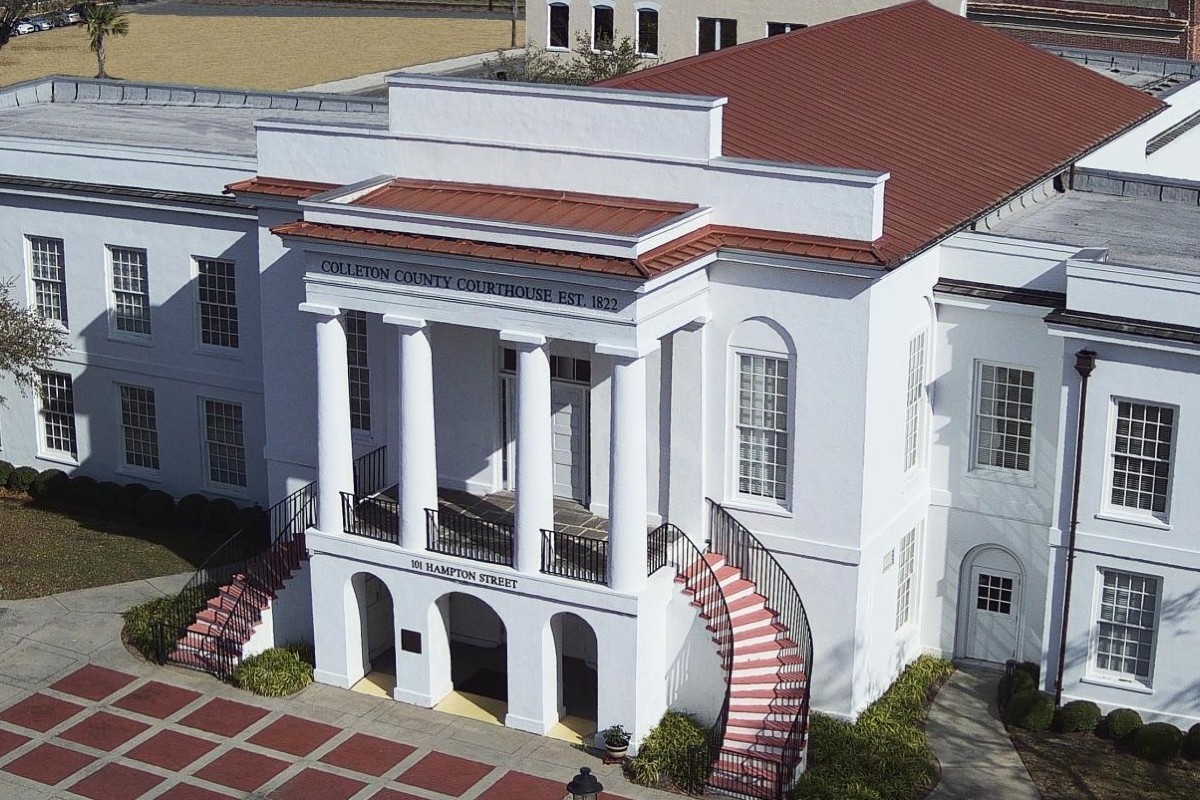
Staff reports | Prosecutors and defense lawyers are making final preparations for next week’s blockbuster murder trial in Walterboro of disbarred lawyer Alex Murdaugh of Hampton County. Murdaugh is charged with the murders of his wife Maggie and son Paul in June 2021. He’s also facing dozens of charges in separate cases involving alleged financial improprieties.

Defense attorneys Dick Harpootlian, a Columbia state senator, and Jim Griffin of Columbia continue to file motions to throw out certain evidence and question the state’s handling of the murder investigation. Meanwhile, prosecutors have remained silent in the lead-up to the trial.
The motions are expected to be taken up after state Circuit Court Judge Clifton Newman has set a jury, which could be a tough task for Colleton County’s relatively small population, according to WCBD-TV. The trial is set to begin Monday in Walterboro, with many local and national news outlets converging in the town to cover the high-profile case.
In other news this week:
S.C. Supreme Court set to be all-male bench. No woman is expected to serve on the state Supreme Court for the first time in 35 years. Lawmakers appear to be ready to replace Justice Kaye Hearn with state appellate court Judge Gary Hill after the other two candidates under consideration dropped out.
![]() McMaster to offer State of the State address next week. Gov. Henry McMaster will offer the 2023 State of the State address Wednesday at the Statehouse. Meanwhile this week, the governor said he wanted $10 million to replace two state planes that some lawmakers say aren’t needed.
McMaster to offer State of the State address next week. Gov. Henry McMaster will offer the 2023 State of the State address Wednesday at the Statehouse. Meanwhile this week, the governor said he wanted $10 million to replace two state planes that some lawmakers say aren’t needed.
S.C. lawmakers want to shuffle how to boost jobs in the state. S.C. House Speaker Murrell Smith and members of a special committee proposed a bill to create the Office of Statewide Workforce Development within the state Department of Employment and Workforce. The new office would be in charge of state-funded workforce development programs.
Tax money for students for private school hits the S.C. Senate floor. A bill that would give some less well off parents and guardians up to $6,000 a year for private school tuition was expected to be the first thing up for debate in the 2023 session for South Carolina senators.
South Carolina still seeking ways to hold executions. South Carolina’s execution methods are currently under debate over the legality of the electric chair and firing squad. Meanwhile, lawmakers are struggling to figure out how 14 other states are receiving drugs to perform lethal injection by attempting to pass a law that would shield the identities of companies that provide the drugs.
Statehouse Republicans divided over who is a Republican. Members of the hard-right House Freedom Caucus and their GOP colleagues butted heads Jan. 19. The debate opened when House Majority Leader Davey Hiott said lawmakers who have not signed onto rules agreed to last month will not be recognized as Republican Caucus members. However, state representatives can still be a part of the Republican Party without being a caucus member.
S.C. lawmakers aim to crack down even more on drunk drivers. A pair of Upstate lawyers in the legislature have sponsored a bill that would require those convicted of drunk driving to pay child support if a parent was killed in a drunk driving-related crash.
Gerrymandered
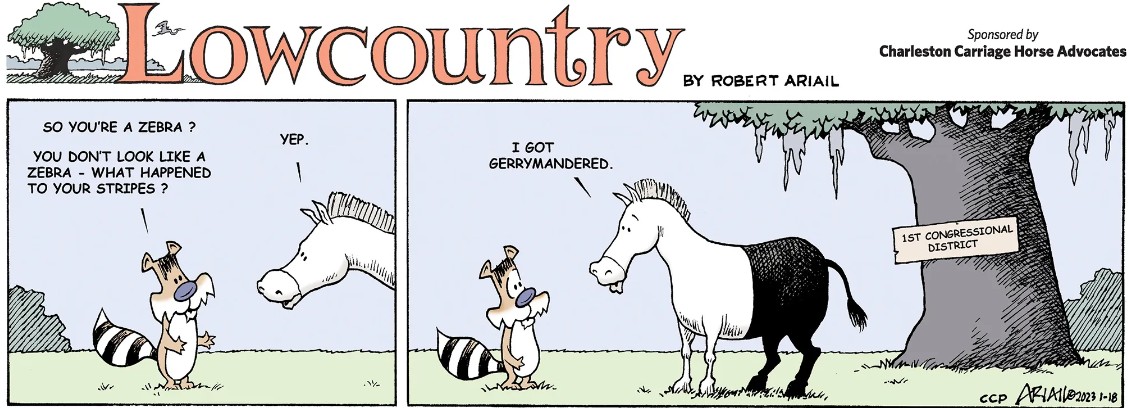
Cartoonist Robert Ariail is pretty clear about how he feels about the legislature’s 2021 remapping of congressional districts, which a three-judge panel sent back to the General Assembly’s drawing board. Ariail often interprets things a little differently, but always has an interesting take on what’s going on. Love the cartoon? Hate it? What do you think: feedback@statehousereport.com.
One American story worth reading
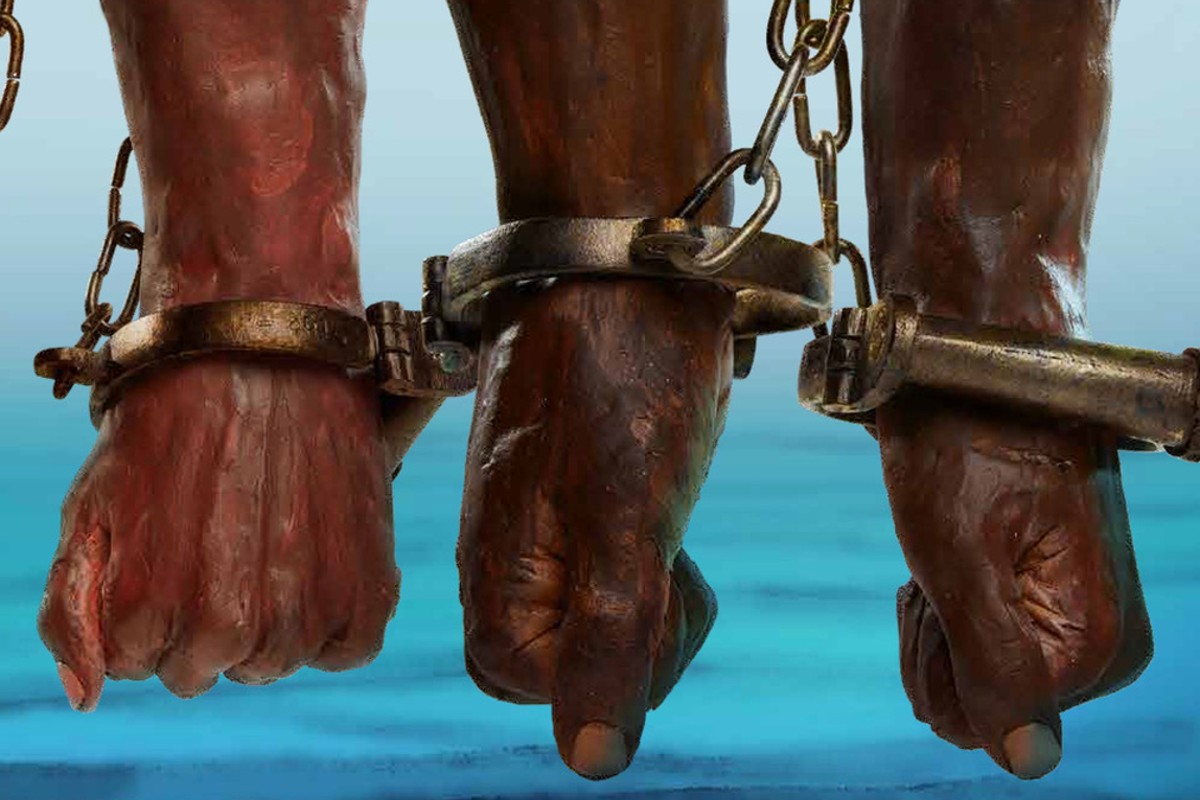
By Andy Brack | There’s a new book you should read. It’s a children’s book so it won’t take long.
 But it tells one American story that too many people don’t understand. In fact, it’s simply called An American Story ($18.99).
But it tells one American story that too many people don’t understand. In fact, it’s simply called An American Story ($18.99).
But what does that mean? It’s a safe bet many White people in America conjure stories of the Pilgrims landing at Plymouth Rock or settlers crossing the Atlantic Ocean to start colonies stretching from Georgia and the Carolinas to Massachusetts. Or they think of stories of families entering this country after long lines at Ellis Island or other seaports.
Not many, we bet, naturally consider the people who came to America on slaving ships. That reference just isn’t in their frame of thinking.
So what award-winning poet and children’s author Kwame Alexander has done is to flip the frame and highlight how the wretched trip from Africa to what became our nation is just as much of an “American story.”
 In Charleston, which will open the International African American Museum sometime soon, this perspective takes on even more import because, remember, 40% of enslaved Africans set foot on this continent in the Holy City.
In Charleston, which will open the International African American Museum sometime soon, this perspective takes on even more import because, remember, 40% of enslaved Africans set foot on this continent in the Holy City.
“How do you tell a story that starts in Africa and ends in horror?” begins the book, illustrated with gripping images by North Carolina artist Dale Coulter. “An unbelievable story about evil plans and big guns hiding in the night, waiting while the girls and the boys finish chores, play games, listen to old tales of trickster spiders and talking drums.”
Make no mistake: This book should not be construed or related to disputes over so-called “critical race theory.” It’s not about politics or hot-button campaign issues or overwrought wonks trying to figure out new ways to divide the country. This is a thoughtful book that tries to lead people to better understand how we got to where we are in the nation. It’s an exploration and explanation that may make many uncomfortable, but it also may help healing, boost acceptance and seed growth in the body politic.

Alexander wrote the book when his 4th grade daughter’s teacher, who happened to be White, was struggling to explain life in the 13 colonies – without talking about “the impact and trauma of slavery.” He eventually realized how anxious the teacher was about teaching about America’s history of slavery – mainly because she was never taught how to approach what is a sensitive subject.
“The underlying issue when it comes to teaching students about slavery and Black history is in general, most teachers — Black or White — are ill-prepared to do so,” said Alexander, 54, during an interview last month. “From different vantage points, they’re confused or ignorant about how to do it.”
Students suffer, he said, when they can’t learn about vexing issues like slavery that continue to haunt us today.
“This book is for all the teachers and parents trying to find their voices, trying to share a lesson that we all find so difficult to discuss.
“An American Story is a story for readers of all ages — a story of a people’s struggle, strength, horror and hope that needs to be told and understood by us all.”
Books like An American Story and the world-class museum coming to Charleston represent new, long-needed efforts to confront our past and help us to move beyond it. We need to stop seeing skin color as a way to divide. Instead, let’s consider it just like we consider the petals of flowers. We love them for their diversity of color – the red in roses, white in magnolias and yellow in Black-eyed Susans. So should it be with humans.
Andy Brack is editor and publisher of Statehouse Report and the Charleston City Paper. Have a comment? Send to: feedback@statehousereport.com.
Palmetto Care Connections
 Statehouse Report is brought to you at no cost thanks to the generous support of underwriters, such as Palmetto Care Connections.
Statehouse Report is brought to you at no cost thanks to the generous support of underwriters, such as Palmetto Care Connections.
Established in 2010, Palmetto Care Connections (PCC) is a non-profit organization that brings technology, broadband and telehealth solutions to health care providers in rural and underserved areas in South Carolina. PCC hosts the Annual Telehealth Summit of South Carolina presenting state and national best practices and trends, as well as providing networking connections for health care, technology and broadband professionals.
The leader of the South Carolina broadband consortium, PCC assists health care providers in receiving broadband savings through the Federal Communication Commission’s Healthcare Connect Fund program. Since 2013, PCC has helped providers save more than $25 million in broadband costs.
PCC co-chairs the South Carolina Telehealth Alliance, along with the Medical University of South Carolina, serving as an advocate for rural providers and partnering with organizations to improve health care access and delivery for all South Carolinians.
- Learn more about Palmetto Care Connections
My dad was S.C.’s last true character

EDITOR’S NOTE: Former U.S. Congressman Arthur Ravenel Jr., a public servant for 60 years and namesake of the U.S. Highway 17 bridge over the Cooper River, died Jan. 16. His funeral is 2 p.m. Jan. 20 at French Huguenot Church, 136 Church St. These thoughts are offered by a son, Thomas, a businessman and South Carolina’s former state treasurer.
By Thomas Ravenel | My father derived a true joy and happiness through public service. Growing up, we’d always have to take the phone off the hook during dinnertime because people he represented — and even those he didn’t represent — called nonstop for help and he helped!

He was never beholden to any party dogma. I’ve had many Democrats tell me he was the only Republican they ever supported because of his environmental positions. He was their “hero” and they’d recount the arguments he’d put up in support of their causes.
He was a man of moderation to the extreme! In 60 years, I never witnessed him drunk or over-indulgent at the dinner table. He was always to bed at 9 p.m. and up at 5:30 a.m. His weight never deviated from when he was released as a teenager from the Marines.
I rarely ever saw him lose his composure and only one time did he completely lose it and that was upon hearing the news that my brother William, who has Downs Syndrome and was in a coma, had only a 40% chance of survival. Luckily, he survived.
His humility knew no bounds. He’d never accept special treatment because of his status and never tried to look too good or act too smart.
I remember my father once told me about going to a celebration of the Ravenel Bridge, held in his honor. He arrived at the event and attempted to park when the parking attendant said, “You can’t park here; it’s only for VIPs. Drive to the other side of the building and park.” I asked Dad what he did. He said he did what the man said and drove to the other side and parked as instructed, thinking it was funny. That’s humility!

Whenever he was flying to Washington, he’d always turn down free offers to move up to first class when there was a vacancy. “No thanks ya,” he’d say. “I’m fine back here.”
A friend of mine who worked for him shared “that lobbyists always wanted to take him out for fancy lunches and suppers and he would politely decline and let the staff go instead. Some of my best days were those when I worked for your dad in the district or on the Hill. He was tough, but fair and always funny.”
He was a product of his times. He was quite thrifty. The Great Depression left him that way. If I didn’t get up to take a shower by 7 a.m., it would be a cold one because he would’ve already turned off the hot water heater.
I can hardly believe I can’t call up Dad as we talked quite a bit on the phone (until just a few days ago) and enjoy all the laughs and love.
With all my recent troubles weighing down on me, I always felt better after those calls. He was never judgmental or if he was, it would be couched in a humorous way. Once, I called and asked if he would give me some personal advice. He responded, “No!” I incredulously inquired, “Why not?” Not one to pull punches, he replied, “Because you never take it!”
With [U.S. Sen.] Fritz Hollings’ passing a few years ago, Dad was the last true character left in South Carolina. I don’t see anyone left to pick up that torch.
Thomas Ravenel, a Charleston businessman and early star of the Southern Charm television series, served as South Carolina’s treasurer in 2007. This commentary first appeared in the Charleston City Paper. Have a comment? Send to: feedback@statehousereport.com
Same reaction on Lee book
![]() To the editor:
To the editor:
I had the exact same reaction as Elliott Brack to Ty Seidule’s book on [Robert E.] Lee, which I read earlier in 2022. I had never considered actions of Confederates as treasonous, but Seidule’s reasoning convinced me, bit by bit. It was eye-opening and very convincing.
– Mary Bostick, Columbia
Enjoy Brack’s articles
To the editor:
I love reading your pithy articles about politics in SC.
– Judy Hines, Charleston
Add verification info to your letters, thoughts
We’ve gotten some letters in the last few weeks – some positive, others nasty. We like to print non-defamatory comments, but unless you provide your contact information – name and hometown, plus a phone number used only by us for verification, we can’t publish your thoughts.
Have a comment? Send your letters or comments to: feedback@statehousereport.com. Make sure to provide your contact details (name, hometown and phone number for verification. Letters are limited to 150 words.
Man on a bench
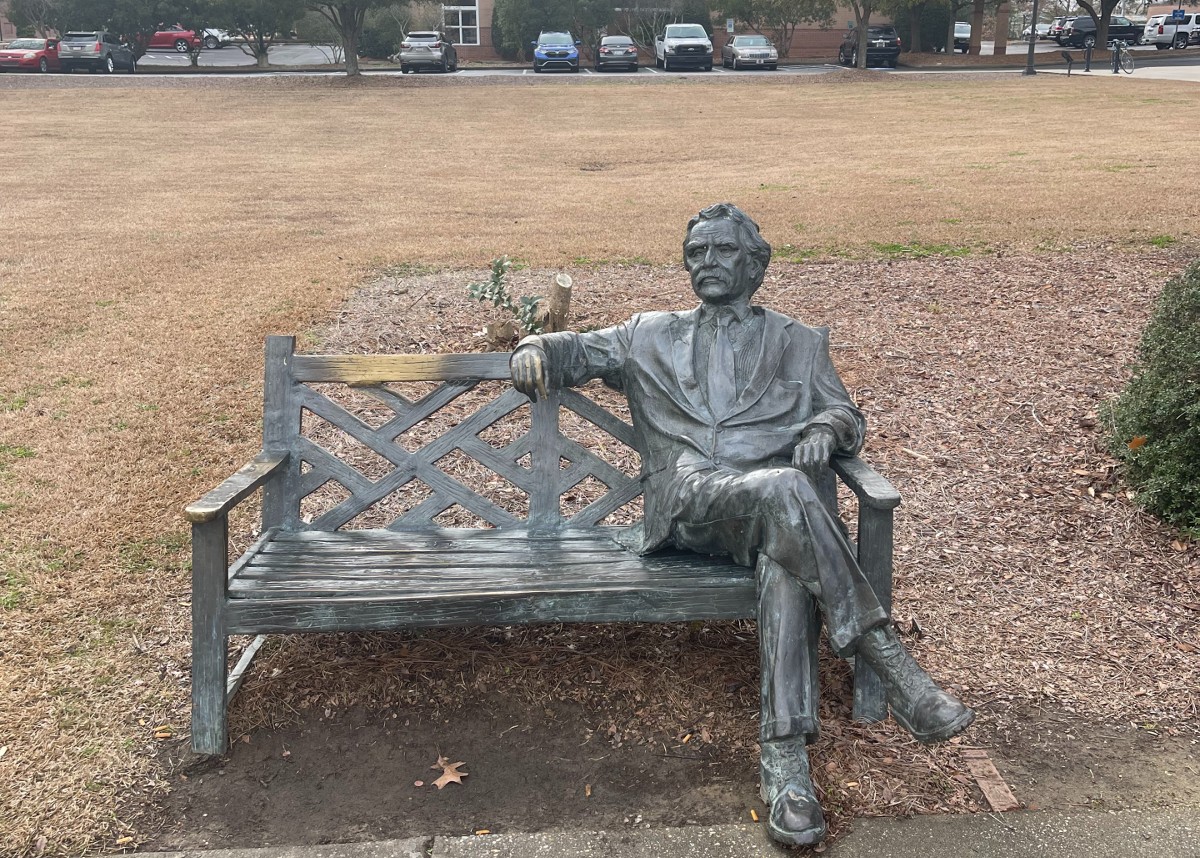
Who is this man on a bench and where is this statue located? Might be tough. Send us your guess – as well as your name and hometown – to feedback@statehousereport.com.
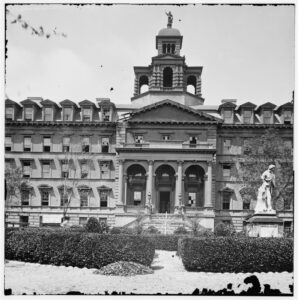 Last week’s phot0, “Another old picture,” was the old Charleston Orphan House, which Summerville resident Daniel Prohaska reminded us was the first public orphanage in the United States. “The statue is one of William Pitt the Elder (1708–1778), first Earl of Chatham, British Secretary of State and then Prime Minister of Great Britain, who was largely responsible for the repeal of the Stamp Act of 1765. It stood in front of the Orphan House from 1808 to 1881. It has had many homes, including the Charleston Museum for a time, and is today inside the restored Charleston County Judicial Center at the corner of Broad and Meeting streets.”
Last week’s phot0, “Another old picture,” was the old Charleston Orphan House, which Summerville resident Daniel Prohaska reminded us was the first public orphanage in the United States. “The statue is one of William Pitt the Elder (1708–1778), first Earl of Chatham, British Secretary of State and then Prime Minister of Great Britain, who was largely responsible for the repeal of the Stamp Act of 1765. It stood in front of the Orphan House from 1808 to 1881. It has had many homes, including the Charleston Museum for a time, and is today inside the restored Charleston County Judicial Center at the corner of Broad and Meeting streets.”
Others who correctly identified the picture – which was taken in 1865 – were Penny Forrester of Tallahassee, Fla.; Jean Prothro, Jay Altman and Elizabeth Jones, all of Columbia; Allan Peel of San Antonio, Texas; George Graf of Palmyra, Va.; David Lupo of Mount Pleasant; Pat Keadle of Wagener; and Curtis Joyner and Judy Hines, both of Charleston.
>> Send us a mystery picture. If you have a photo that you believe will stump readers, send it along (but make sure to tell us what it is because it may stump us too!) Send to: feedback@statehousereport.com and mark it as a photo submission. Thanks.
- ORDER NOW: Copies are in Lowcountry-area bookstores now, but if you can’t swing by, you can order a copy online today.
- Now available as an e-book!
ABOUT STATEHOUSE REPORT
Statehouse Report, founded in 2001 as a weekly legislative forecast that informs readers about what is going to happen in South Carolina politics and policy, is provided to you at no charge every Friday.
- Editor and publisher: Andy Brack, 843.670.3996
Donate today
We’re proud to offer Statehouse Report for free. For more than a dozen years, we’ve been the go-to place for insightful independent policy and political news and views in the Palmetto State. And we love it as much as you do.
But now, we can use your help. If you’ve been thinking of contributing to Statehouse Report over the years, now would be a great time to contribute as we deal with the crisis. In advance, thank you.
Buy the book
Now you can get a copy of editor and publisher Andy Brack’s We Can Do Better, South Carolina! ($14.99) as a paperback or as a Kindle book ($7.99). . The book of essays offers incisive commentaries by editor and publisher Andy Brack on the American South, the common good, vexing problems for the Palmetto State and interesting South Carolina leaders.
More
- Mailing address: Send inquiries by mail to: P.O. Box 21942, Charleston, SC 29413
- Subscriptions are free: Click to subscribe.
- We hope you’ll keep receiving the great news and information from Statehouse Report, but if you need to unsubscribe, go to the bottom of the weekly email issue and follow the instructions.
- Read our sister publication: Charleston City Paper (every Wednesday in print; Every day online)
- © 2023, Statehouse Report, a publication of City Paper Publishing, LLC. All rights reserved.















 We Can Do Better, South Carolina!
We Can Do Better, South Carolina!